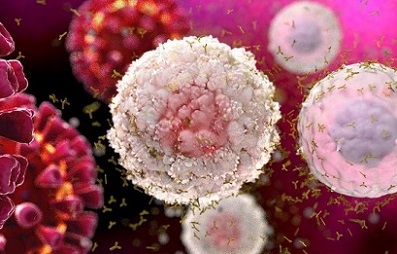Nikhil Prasad Fact checked by:Thailand Medical News Team Feb 17, 2024 1 year, 3 weeks, 2 days, 5 hours, 31 minutes ago
COVID-19 News: The COVID-19 pandemic, precipitated by the emergence of the SARS-CoV-2 virus, has profoundly impacted global health systems, economies, and societies since its onset in late 2019. As researchers race to understand the intricacies of this novel coronavirus, the role of the immune system has emerged as a central focus. Immune cells orchestrate the body's defense against pathogens, yet the specific immune cell characteristics influencing susceptibility to COVID-19 remain elusive. In response, a pioneering study covered in this
COVID-19 News report, conducted at Jiangbin Hospital of Guangxi Zhuang Autonomous Region, China, has employed a sophisticated Mendelian randomization (MR) approach to unravel the genetic interface between immunity and COVID-19.
 Unraveling COVID-19 Risk: How Immune Cell Genetics Shape Susceptibility
The Complex Interplay Between Immune Cells and COVID-19
Unraveling COVID-19 Risk: How Immune Cell Genetics Shape Susceptibility
The Complex Interplay Between Immune Cells and COVID-19
The immune response to SARS-CoV-2 infection is a multifaceted interplay between the virus and various immune cells. Recent research, including a study published in Cell, has revealed the presence of viral RNA within a plethora of immune cells, expanding our understanding of the cellular targets of SARS-CoV-2. This finding suggests that the virus's reach extends beyond respiratory epithelial cells, potentially contributing to its transmissibility and pathogenesis.
Furthermore, the immune response to COVID-19 involves a cascade of events, from the recruitment of innate immune cells like macrophages and neutrophils to the activation of adaptive immune responses mediated by T and B cells. Dysregulated immune responses can lead to severe lung damage and systemic inflammation, highlighting the need for a deeper understanding of the immune cell characteristics that modulate COVID-19 susceptibility.
Materials and Methods
The study at Jiangbin Hospital utilized publicly available genetic datasets from the COVID-19 Host Genetics Initiative and the Blueprint Consortium. Leveraging a two-sample Mendelian randomization approach, the researchers investigated the association between 731 immune cell signatures and the risk of COVID-19. Immune cell traits were categorized into four main types: median fluorescence intensity (MFI), relative cell count (RC), absolute cell count (AC), and morphological parameters (MP). The inverse-variance weighted (IVW) method served as the primary analysis, complemented by sensitivity analyses to assess result robustness.
Results and Key Findings
The comprehensive analysis unveiled 30 distinct immune cell characteristics significantly associated with COVID-19 risk.
Notable among these were CD4+ regulatory T cells (Tregs), CCR2+ CD14- CD16+ monocytes, and various dendritic cell (DC) subsets. Of particular significance was the expression of CCR2 on CD14-CD16+ monocytes, which emerged as a key factor influencing immune cell attributes in the context of COVID-19.
The Impact of B-Cell Subsets and Dendritic Cells
Subsequent analyses delved into the role of specific B-cell subsets and dendritic cells in COVID-19 susceptibility.
Associations were observed between CD27 expression on Unswitched Memory B cells, CD24 expression on IgD+ CD24+ B cells, and CD11c+ HLA DR++ monocytes, highlighting their potential protective effects against COVID-19. Conversely, IgD+ CD24+ B cells and Memory B cells were identified as risk factors. Additionally, the expression of CCR2 on plasmacytoid DCs emerged as a highly significant factor influencing COVID-19 outcomes.
Treg Cells and Monocyte Subsets
Further analyses explored the role of regulatory T cells (Tregs) and monocyte subsets in COVID-19 susceptibility.
Protective effects were associated with CD8 expression on CD28-CD8+ T cells, while CD4+ Tregs and specific monocyte subsets were identified as risk factors.
Implications and Future Directions
The study's findings provide valuable genetic evidence for understanding the complex relationship between immune cell characteristics and COVID-19 susceptibility. By employing a rigorous Mendelian randomization approach, the researchers have identified key immune cell traits that may influence individual susceptibility to COVID-19. These findings have significant implications for vaccine development, treatment strategies, and public health interventions aimed at mitigating the impact of the COVID-19 pandemic.
Conclusion
In conclusion, this pioneering study sheds light on the genetic landscape of immunity in the context of COVID-19. By unraveling the intricate relationship between immune cell characteristics and COVID-19 susceptibility, the study provides critical insights into the underlying mechanisms driving individual variations in disease susceptibility and severity. Moving forward, these findings pave the way for targeted interventions and personalized approaches to combatting the COVID-19 pandemic, underscoring the crucial role of genetics in understanding and addressing global health challenges.
The study findings were published on a preprint server and are currently being peer reviewed.
https://www.researchsquare.com/article/rs-3941833/v1
For the latest
COVID-19 News, keep on logging to Thailand Medical News.
